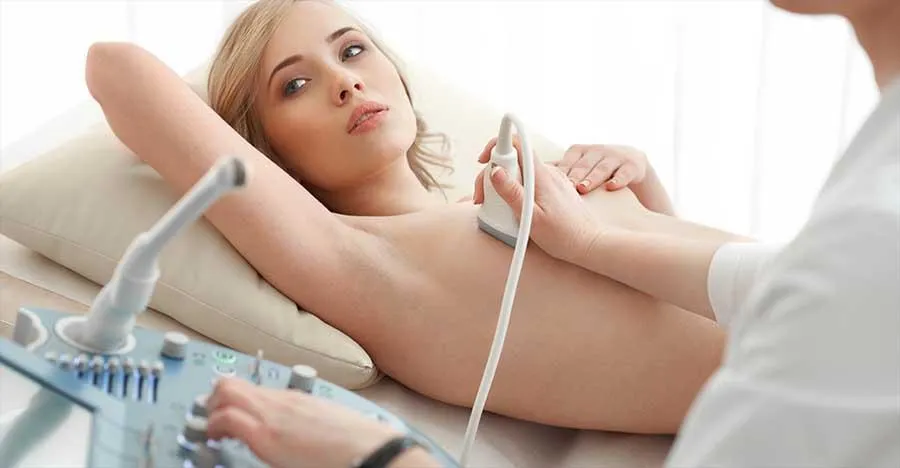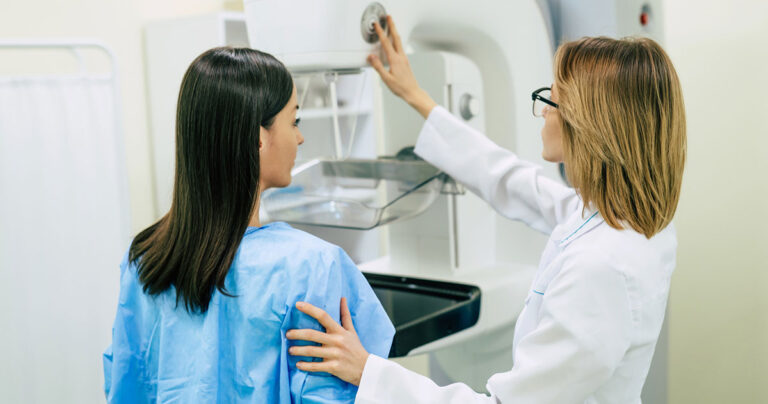Many people worry about breast cancer but aren’t sure when or how to start breast screening. This uncertainty can be stressful, especially when trying to balance health concerns with daily life.
What is Breast Screening?
Breast screening is a test used to check for early signs of breast cancer, even before symptoms appear. The goal is to catch cancer early, when it’s most treatable. Screening helps detect abnormalities that might not yet be noticeable, allowing for timely intervention and better outcomes.
Who Should Get Screened?
In the UK, women aged 50 to 71 are automatically invited for screening every three years. However, if you’re under 50 or over 71, or if you have concerns, you should speak with your GP about whether you need screening.
Risk factors like a family history of breast cancer or certain genetic mutations may mean you need to start screening earlier. It’s important to discuss your personal risk with your doctor to determine the best approach for you.

Types of Breast Screening
Breast screening involves various methods to check for signs of cancer. Each type has its own purpose and benefits.
Mammography
Mammography is a key tool in breast cancer screening. It helps find potential problems before symptoms appear.
Explanation of the Procedure
During a mammogram, your breast is gently compressed between two plates to get a clear X-ray image. The process only takes a few minutes and may cause some discomfort but is generally quick and manageable.
How It Detects Abnormalities
The X-ray images produced can reveal tiny lumps or unusual changes in breast tissue. These could be early signs of cancer, allowing for further investigation and early treatment if needed.
Frequency of Screening
In the UK, women aged 50 to 71 are invited for a mammogram every three years. If you have higher risk factors, you might need more frequent screenings as advised by your healthcare provider.
Ultrasound
Ultrasound is often used alongside mammography to get a clearer picture of breast tissue.
When It’s Used in Conjunction with Mammography
Ultrasound is typically recommended if a mammogram shows something unusual or if you’re under 40. It helps to further investigate areas that may be dense or difficult to assess with X-rays alone.
Benefits and Limitations
The main benefit of ultrasound is that it can distinguish between solid masses and fluid-filled cysts. It’s painless and doesn’t involve radiation. However, it may not always detect small or early-stage cancers as effectively as mammography.
Breast MRI
Breast MRI is a more advanced imaging technique used in certain situations to gain detailed insights into breast health.
Indications for MRI
An MRI is typically used if mammography or ultrasound results are inconclusive, or if there’s a high risk of breast cancer. It’s also used to examine the extent of cancer if you’ve already been diagnosed.
How It Differs from Mammography and Ultrasound
Unlike mammography and ultrasound, MRI uses powerful magnets and radio waves to create detailed cross-sectional images. This method can show more detail and is especially useful for evaluating complex cases, but it’s more expensive and not usually used as a first-line screening tool.
The Screening Process
Understanding what happens before and during your breast screening can help you feel more prepared and less anxious.
Before the Screening
Preparing for your breast screening can help ensure the process goes smoothly.
Preparation Tips
On the day of your screening, avoid using deodorant, lotion, or perfume, as these can interfere with the results. Wear comfortable, easily removable clothing, preferably a two-piece outfit, to make changing easier.
What to Expect During the Appointment
Arrive a few minutes early to complete any necessary paperwork. During the appointment, you’ll be asked to remove your upper clothing and put on a gown. The radiographer will explain each step of the procedure to you.
During the Screening
Knowing what happens during each type of breast screening can help ease any concerns you may have.
Description of the Procedures for Each Type of Screening
- Mammography: Your breast will be placed between two plates and gently compressed to take X-ray images.
- Ultrasound: A gel is applied to the breast, and a probe is moved over the area to capture images using sound waves.
- Breast MRI: You’ll lie on a table that slides into a large tube where detailed images are taken using magnetic fields and radio waves.
Duration and Discomfort Levels
Mammography might cause brief discomfort due to compression but lasts only a few minutes. Ultrasound is generally painless and takes about 15-30 minutes. Breast MRI is longer, usually around 30-45 minutes, and involves lying still in a confined space, which some people find uncomfortable.
After the Screening
Once your breast screening is complete, understanding your results and knowing the next steps can help you stay informed and calm.
Receiving and Understanding Results
Results are usually sent to you within a few weeks. If everything is normal, you’ll receive a letter confirming this. If there are any concerns, you’ll be contacted for further tests.
Follow-Up Procedures if Abnormalities Are Found
If an abnormality is detected, you may be called back for additional imaging or a biopsy. These follow-up tests help determine if there’s a need for treatment and what the next steps should be. Your healthcare provider will guide you through this process and discuss any further action required.
Benefits of Regular Breast Screening
Regular breast screening plays a crucial role in maintaining breast health and improving treatment outcomes.
Early Detection
Early detection of breast cancer significantly improves the chances of successful treatment and recovery.
How Early Detection Improves Outcomes
Detecting cancer at an early stage often means it is smaller and has not spread. This allows for less invasive treatments and a higher likelihood of curing the disease. Early detection can also lead to better overall survival rates and less aggressive treatment options.
Case Studies or Statistics
Research shows that women who undergo regular screenings are 25% more likely to survive breast cancer compared to those who do not. For example, a study by the NHS found that early detection through mammograms increased the five-year survival rate for breast cancer patients to over 90%.
Peace of Mind
Regular breast screening can provide significant peace of mind and reduce anxiety about breast health.
Reducing Anxiety with Regular Checks
Knowing that you are being monitored regularly helps alleviate concerns about potential breast cancer. Routine screenings allow for early detection, which reduces uncertainty and stress, knowing that any issues can be addressed promptly. Regular checks reassure you that your health is being actively managed, making it easier to focus on other aspects of your life.
Personal Health Management
Breast screening is an essential part of proactive health management, helping you stay ahead of potential issues.
Role in Proactive Health Care
By scheduling regular screenings, you actively manage your health and reduce the risk of serious disease. Early detection of abnormalities allows for timely intervention, which can prevent more severe health problems. This proactive approach ensures you are taking charge of your health and making informed decisions about your care.
Risks and Limitations
While breast screening is highly beneficial, it’s important to be aware of its limitations and potential risks.
False Positives
False positives are a known part of breast screening, where the test indicates a problem that isn’t actually there.
Explanation and Impact
A false positive means the screening suggests an abnormality, but further tests show no cancer. This can cause unnecessary anxiety and lead to additional procedures, which might be stressful. While false positives are frustrating, they help ensure that any genuine concerns are thoroughly investigated.
False Negatives
False negatives occur when a screening test fails to detect cancer that is actually present.
Limitations of Breast Screening
A false negative means the test result is normal, even though there is an issue. This can give a false sense of security and delay diagnosis. While screening tests are effective, they are not perfect, and some cancers might still go undetected, which is why regular check-ups and awareness of any changes in breast health are crucial.
Radiation Exposure
Breast screening involves some level of radiation, but safety measures are in place to minimise risks.
Safety Measures and Concerns
Mammograms use low doses of radiation, which are considered safe for most people. The amount is minimal and much lower than the radiation used in other medical imaging. Regular screening is carefully managed to ensure that the benefits of early cancer detection outweigh the potential risks of radiation exposure.
Cost and Accessibility
Understanding the cost and accessibility of breast screening can help you plan for this important health check.
Cost of Screening
The cost of breast screening can vary depending on where you live and whether you choose private or NHS services.
Overview of Costs in Various Regions
In the UK, breast screening through the NHS is free of charge. Private screenings typically cost between £100 and £200. The exact price may differ based on the provider and location.
Insurance Coverage and Financial Assistance
Most health insurance plans cover the cost of breast screening. If you are struggling with costs, check with your insurance provider for details on coverage and any financial assistance options available to help manage expenses.
Access to Services
Ensuring you have access to breast screening services is essential for maintaining your health.
Availability of Screening Facilities
Screening facilities are widely available across the UK. NHS offers routine screenings through various clinics and hospitals, and private options are also accessible in many areas.
How to Find a Local Screening Centre
To find a local screening centre, visit the NHS website or use their online search tool. You can also contact your GP for information on nearby facilities and how to book an appointment.
FAQ
Here are answers to some common questions about breast screening to help clarify your concerns.
How often should I get screened?
In the UK, women aged 50 to 71 are invited for screening every three years. If you’re under 50 or over 71, or have additional risk factors, consult your GP for personalised advice.
What should I do if I have a family history of breast cancer?
If you have a family history of breast cancer, you may need to start screening earlier or have more frequent check-ups. Discuss your family history with your GP to determine a suitable screening plan.
Are there alternative methods for those who cannot undergo traditional screening?
If traditional screening methods are not suitable, alternatives like ultrasound or MRI might be recommended. Your healthcare provider can discuss these options and help find the best approach for your needs.
Conclusion
Breast screening is crucial for early detection and improving treatment outcomes. Regular mammograms, ultrasounds, and MRIs each play a role in monitoring breast health. Understanding the procedures and their benefits can help you make informed decisions about your care.
Don’t wait to take charge of your health. Schedule your breast screening today and stay proactive about your breast health. Regular check-ups can make a significant difference in early detection and overall wellbeing.

